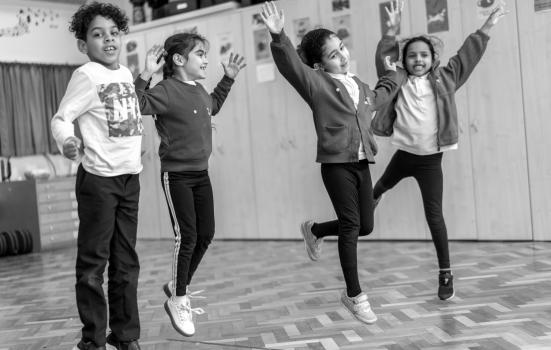Study finds that every £1 spent on a primary school performing arts programme generates up to £32 in long-term socioeconomic returns.

James Barke
Expansion of a performing arts project to all primary schools in the 20% most deprived areas in England it could be worth up to £3.3bn to the economy, a report analysing the impact of a year-long programme by charity Artis has suggested.
The study, which took place during the 2020-2021 academic year when schools were closed for several months due to the pandemic, was conducted with the help of Pro Bono Economics, a charity helping other charities to understand and improve their impact and value.
Teachers used a behavioural screening tool called the Strengths and Difficulties Questionnaire (SDQ) to assess children’s socio-emotional states at the beginning and end of the academic year.
READ MORE:
Economists then used a study linking SDQ scores in early life to several key outcomes in later life to assess the programme’s long-term economic benefits both to the children and to society, when compared to the programme’s delivery costs.
The report, written by independent economists for Pro Bono Economics and based on data provided by Artis, found that “every £1 invested in the Artis programme can provide up to £32 return in long-term economic benefits, provided that improvements in children’s outcomes do not fade out over time”.
The calculations equate to an average lifetime monetary benefit of £2,300 per child on the Artis programme and up to £8,654 per child for children who initially scored poorly on the questionnaire. The calculations are based on projected improvements in future truancy, exclusion, crime, smoking, mental health and earnings.
“This is the sort of evidence that the government needs in order to reintroduce the arts into primary schools,” said Rebecca Boyle Suh, Co-Founder and Executive Chair of Artis.
“They've dropped significantly in primary schools over the last 10 years. A lot of it is funding. A lot of it is down to the arts not being prioritised. And it's only getting worse… So this sort of report is really important to make the case for why the arts are essential in schools.”
Arts in support of learning
The Artis programme places specially trained performing arts educators into primary schools where they work one day a week, giving lessons to children aged between four and 11.
Using dance, drama and music, they design classes that complement the national curriculum, helping to reinforce understanding through participatory learning.
Suh said the programme benefits children in "many ways" but the study looked solely at the socioeconomic benefits, which are related to the children's ability to socialise, their behaviour and their emotional regulation.
She added that measuring the programme’s impact through SDQ scores, the approach suggested by Pro Bono Economics, means the results can be easily understood by funders and government bodies.
“This is how the government also collects their data when they're looking at the wellbeing of children, so it gives additional weight to the fact that if these scores are changing, they understand what that means,” she said.
“The exciting bit for me is how we can use this data to reach more children or to be better advocates for the arts in education.”
Benfitting high-needs children
The study, which analysed data from 128 randomly selected children across eight schools, found that the Artis programme had a “highly significant” impact on children who presented with high levels of difficulty at the start of the academic year.
Overall, the average SDQ scores of all participating children rose slightly, meaning a deterioration in their overall wellbeing, but this may have been a result of the pandemic. An NHS study from July 2020 found that “clinically significant mental health conditions amongst children had risen by 50% compared to three years earlier”, the report said.
Schools were closed for one term during the period of the study, meaning that Artis classes were moved online, potentially limiting their impact.
“There's a lot of noise going on, a lot of other things that happen in the world that affect this, so that makes it very hard to capture statistically significant and robust outcomes, but for the group that come in with high levels of need at the start, there you can see a statistically significant improvement,” said Matthew Whittaker, Chief Executive at Pro Bono Economics.
To establish the impact of the programme, the economists subtracted the average improvement in SDQ scores for children of the same age from improvements in scores seen among the children taking Artis classes.
“The schools that we work in are in the top 20% of most deprived areas so the children in these schools are struggling with all sorts of complexities in their lives, whether it be housing, or drug addiction at home, or fathers in prison,” Suh said.
Working with Pro Bono Economics to establish a long-term investment-to-return ratio for the programme, has created “another incredibly powerful argument as to why the arts are essential in children's learning, not just for their academic attainment, but for their ability to understand themselves and to know how to interact with others, to express how they feel and so improve their wellbeing”, she said.
Calculating costs and returns
The economic benefits of the programme were calculated based on the results of a study by the Department of Education, which established a long-term monetary gain for every one point improvement in childhood SDQ scores.
A reduction in score, such as those seen in higher needs children in the Artis programme, “means lower probability of truancy, of smoking, of depression, of committing crime as a young adult and higher probability of being in work and of having a higher pay level as an adult too”, said Whittaker.
“It’s not an exact science, but you can be reasonably confident you're getting a large and statistically significant overall net gain in lifetime benefits for the kids that go through the Artis programme. About 60% of that will go to the kids themselves, in terms of more likely to be employed, more likely to get higher pay, and 40% is going to the government and wider society.”
The findings of the initial study can be reinforced and expanded with further data, he added. “The more data we get, the more confident we can be about the ballpark for those figures. With bigger sample sizes, you might start to see some positive impacts for the other kids too.”
Suh said that Artis will continue collecting data annually. “Already for this past academic year, we have double the number of children participating, so we will continue to build the number in the study,” she said.




